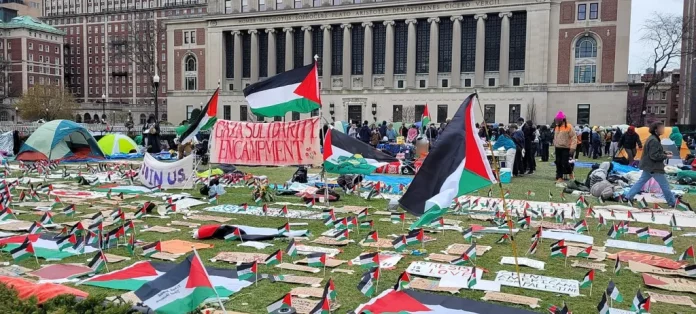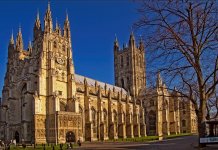A host of liberal church caucus groups are offering their support to anti-Israel student protests underway at college campuses, including at least two denominationally-funded agencies. Their vocal support for what has become an intersectional progressive cause has overridden concerns about antisemitism.
“We stand in solidarity with the students protesting in encampments across the country,” a “statement in solidarity with student protests for Gaza” signed by scores of groups reads. “We reaffirm our commitment to amplifying their voices, condemn the university administration officials’ violent response to their activism, and demand that universities remove the presence of police and other militarized forces from their campuses.”
The statement calls for a immediate ceasefire and an end to the U.S. government’s role in what it alleges to be an “ongoing genocide of Palestinians in Gaza.”
Several institutions of higher education have called on law enforcement to remove protesters blocking access to, and in some cases vandalizing, campus facilities after repeated warnings to disperse were disregarded.
Both the Presbyterian Church (USA) Office of Public Witness, which serves as the denomination’s Capitol Hill lobby office, and the American Baptist Churches USA have signed the statement “in solidarity with the students” protesting in encampments and otherwise to condemn Israeli military strikes in Gaza. The PCUSA office has accelerated its aggressive anti-Israel policies and charged the Middle East democracy as an “Apartheid” state.
The letter, citing the International Court of Justice, a federal judge in California (who ruled that his court did not have jurisdiction), and unnamed human rights organizations, claims that Israel’s actions in the Gaza war “plausibly” constitute genocide. Hamas and the October 7 attacks resulting in the deaths of more than 1,200 in Israel and the kidnapping of scores of hostages are unmentioned.
“We commend the students who are exercising their right to protest peacefully despite an overwhelming atmosphere of pressure, intimidation and retaliation, to raise awareness about Israel’s assault on Gaza – with U.S. weapons and funding. These students have come forth with clear demands that their universities divest from corporations profiting from Israeli occupation, and demanding safe environments for Palestinians across their campuses. The students’ courage and determination in the face of adversity inspire us all to take action and speak out against injustice wherever it occurs. As they risk everything right now, it is critical that all of us do everything we can to support them.
Pro-Israel groups have documented anti-semitic signage at campus protests and recorded protesters blocking Jewish students’ access to campus buildings at institutions of higher education.
The statement of support is also signed by the liberal Alliance of Baptists, the American Friends Service Committee, liberal Catholic group Pax Christi USA, and the liberation theology group Sabeel. Several mainline caucus groups have also signed, including United Methodists for Kairos Response (UMKR), Episcopal Peace Fellowship-Palestine Israel Network, United Church of Christ Palestine Israel Network, Presbyterian Peace Fellowship, Israel/Palestine Mission Network of the Presbyterian Church (U.S.A.) and American Baptist Churches Palestine Israel Network.
Many of the anti-Israel caucus groups are highly visible participants at denominational governing conventions, including the United Methodist General Conference meeting this week in Charlotte, the Presbyterian Church USA General Assembly meeting June 25 – July 4 in Salt Lake City, and Epicopal General Convention meeting June 23 – 28, 2024 in Louisville. Each of the denominations will consider several anti-Israel resolutions, including language decrying Israel’s military conflict with Hamas as a “genocide” against Palestinians.
This now-customary criticism is aimed uniquely at Israel. Substantive accusations of genocide, including the ethnic cleansing of 120,000 Armenian Christians from Nagorno Karabakh by Azerbaijan in September, or the ongoing deaths of Christians in Nigeria at the hands of Islamist militants, draw little interest, just as atrocities in Syria’s civil war merited no strong demands.










